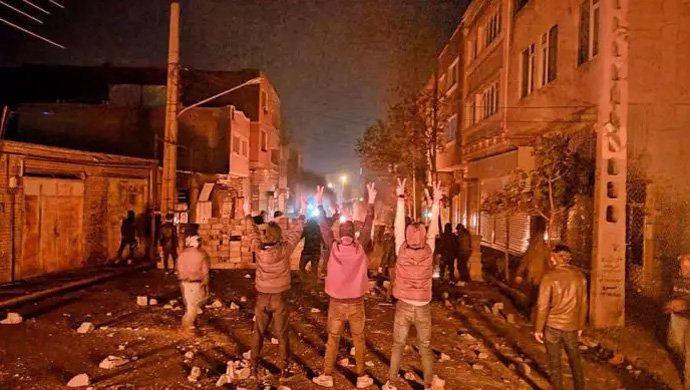The following article was submitted by a member of the MEK Resistance Units in Iran. The author’s name has been redacted due to security concerns.
It has now been more than two months since my fellow Iranians and I took to the streets following the murder of Mahsa Amini at the hands of the regime’s “morality police.” During this time, we have continually emphasized that such fatal abuses are part of the clerical regime’s DNA and that they will not stop until that regime falls and is replaced by one that truly reflects the will of the Iranian people.
I know that I speak for millions of my compatriots when I say that we are prepared to continue our current uprising, at great personal cost, until that vision of regime change is realized.
Already, the authorities have killed at least 550 protesters, and the state media has boasted of more than 1,000 indictments in the capital city alone. Some of those indictments are under the charge of “enmity against God,” a charge that, although vaguely defined, can carry the death penalty. Meanwhile, the main democratic opposition group, the People’s Mojahedin Organization of Iran, has determined that over 30,000 protesters have been arrested in total.
Yet none of this has even made a dent in the strength of the uprising. Quite to the contrary, each new killing sparks further unrest, both in its immediate aftermath and when memorials are held for the martyrs on the seventh and 40th days of their deaths, as is tradition in Iran.
Last month, thousands of people gathered to hold such a ceremony for Mahsa Amini near her hometown of Saqqez, despite authorities closing roads and threatening reprisals against the mourners. Since then, similar gatherings have marked 40 days since the deaths of several victims of the regime’s crackdown, including teenage children. Across all of these gatherings, the message is clear: none of their deaths will be in vain.
Nothing less than regime change will deliver upon that promise. Furthermore, regime change will retroactively give meaning to the deaths of tens of thousands of activists and dissidents who have fought back against the regime’s tyranny and repression for the past 43 years. These include the 1,500 civilians killed within days of a prior uprising in November 2019 and the 30,000 political prisoners who were killed during the summer of 1988, the vast majority of which were members of the PMOI.
The international community has unfortunately declined to do much to honor our sacrifices over the years. Although the United Nations acknowledged the 1988 massacre in its immediate aftermath, neither it nor its leading member states took meaningful steps to pursue accountability for the perpetrators, who include Iran’s current president Ebrahim Raisi. And in 2019, when Raisi was head of the nation’s judiciary, Western powers paid lip service to the protesters’ democratic aspirations, yet largely ignored the ensuing crackdown.
We expect better of the free world. We are all committed to achieving regime change through our own efforts and neither seek nor accept direct foreign intervention into our nation’s affairs. But most of us understand all too well the importance of Western measures that either bestow or deny legitimacy to Iran’s clerical establishment.
It seems clear that the European Union, the United Kingdom, and the United States have typically set their policies toward the Iranian regime based on the false assumption that the mullahs’ hold on power was secure and that no viable alternative was prepared to take over. This is to say that those Western powers were always willing to believe that when Iranians died in the struggle against their repressive government, they died in vain. We, however, have never accepted this, and current events are set to prove that we were correct in our beliefs and Western pessimism was wrong.
The death toll from the current uprising is unquestionably tragic and indicative of the regime’s brutality. But after nearly two months, that death toll is still only a third of what the Islamic Revolutionary Guard Corps brought about within days of the November 2019 protests breaking out. This is a testament to the sheer scale and geographic diversity of the new uprising, as well as the people’s willingness to stand toe-to-toe against repressive authorities, often wielding sticks and stones against live ammunition and tear gas.
As has been true of other historic revolutionary movements throughout the world, our ongoing resilience is a sign of our potential victory. It is also a reflection of the underlying organization spearheaded by PMOI-affiliated Resistance Units, a network I proudly belong to. This organization not only reinforces the image of a potential civilian victory but also signals that our victory will lead to a definite outcome.
In light of all of the above, Western policymakers should now be seriously reconsidering their assumptions about the future of the Iranian nation. More than that, they should be looking back with regret on their decisions to withhold support from earlier protest movements, and thus resolving to do better for the current movement as it stretches into its third month.
“Doing better” means, first and foremost, acknowledging our right to fight back against government repression by any means necessary. But it also means recognizing that the existing regime really could fall to its people and that it deserves to do so. The international community doesn’t need to directly intervene in order to bring about that outcome; but it doesn’t need to support Iran’s collapsing establishment, either.









